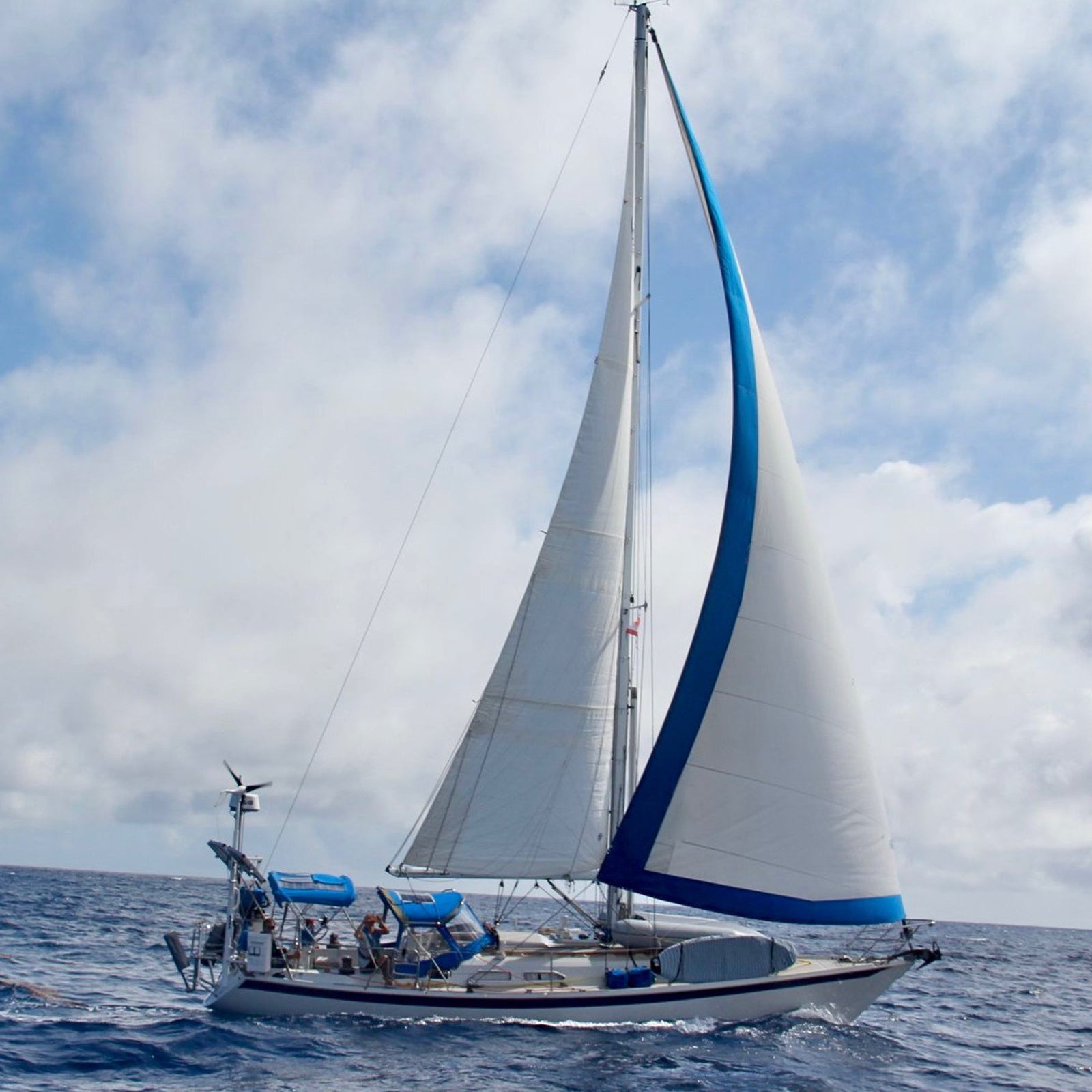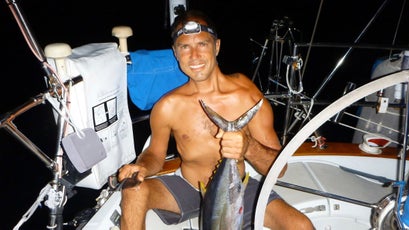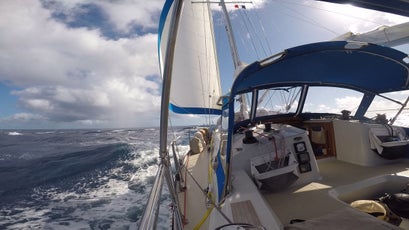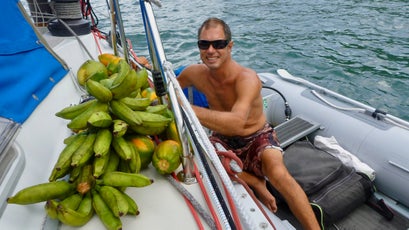When I come across someone I havenÔÇÖt seen in a while, they often ask me, ÔÇťHowÔÇÖs your health?ÔÇŁ They are asking about the genetic defect that causes muscles throughout my body to continuously disappear. If you want to know more about my weakness, google , and youÔÇÖll learn how this progressive╠řdisease sometimes leaves me too weak to even close my eyes, smile, or kiss the people I love. But I prefer to focus on my strengths. Like my ability to adapt equipment or discover new techniques to accomplish tasks like raising sails or moving around a╠řboat.
For example, I╠řused to get stuck╠řwhile taking off a T-shirt because my arms were too weak to lift it over my head.╠řIÔÇÖd end up walking around with the shirt half over my head, my arms pinned inside like a straightjacket, banging into furniture and walls until my wife, Nicole, or a friend would free me. Now I bend forward, fling my arms up╠řto catch the bottom of the shirt, then let gravity pull my arms down and the shirt╠řoff.╠řI use a similar trick for washing my hair.╠řItÔÇÖs half yoga and half Houdini.
Seven years ago, when ║┌┴¤│ď╣¤═° named me its╠řReader of the Year,╠řI wrote that ÔÇťIÔÇÖm screaming within, like a captured animal slamming itself against the walls of its cage.ÔÇŁ Now╠řIÔÇÖm in my mid-forties, and since then, a few things have changed. Nicole╠řand I got a small sailboat in 2012, and in 2014, we set off from San Diego to sail╠řacross the Pacific Ocean. Four years and 15,000 miles of open-ocean adventures have flung the door to my cage wide open and let me discover some profound truths about myself.
For example, I like watching goats.
Nicole and I once spent five months anchored in a tiny secluded bay of╠řone of the most remote Polynesian islands in the South Pacific. The island was a rugged paradise with steep cliffs and mountains, heavy vegetation, and not much else. The bay was exposed to open-ocean swells, so our boat was always rolling, pitching, and bobbing. It was far from comfortable, but the movement reminded us that the ocean is alive. When those swells reached the head of the bay, they unleashed upon a shallow reef and formed an incredibly fun wave.╠řThe cliffs surrounding the bay had dozens of feral goats who╠řspent their days skittering around from rock to rock, happily living uncomplicated╠řlives.
I soon understood my excessive fear was fueled by endless thoughts of what-ifs instead of what is.
For three of the five months we were anchored in the bay, I did not set╠řfoot on land, simply because I didnÔÇÖt see a need to.╠řWe would wake up, practice yoga, meditate, watch goats, surf, eat, do boat work, read and write, make love, and sleep. Not necessarily in that order.
It wasnÔÇÖt easy. The days were intensely hot that close to the equator. We ate fruit and fished╠řnear the boat, but if we couldnÔÇÖt catch anything, our diet was reduced to canned food and rice. Our only source of fresh water was what we made from the sea. To power the desalinator, a machine that makes drinking water from sea water,╠řwe had to maintain a robust solar-electrical system, on a moving boat, in a salty environment. We had no internet access, phone service, television, or AM/FM radio. Our only connection to the outside world was via our long-distance high-frequency radio, and that only worked when atmospheric conditions allowed our signal to propagate. There were no doctors, no police, no stores, no anything.
While we were there, Nicole flew to the U.S. for a month to visit family for the first time since we sailed away. At first I was terrified. I was alone on a small boat without the strength to get back on board if I accidentally fell in the water.╠řThere was no easy way for me to swim to shore. The year before, 50 percent of the indigenous population in these islands╠řhad contracted dengue fever, and when youÔÇÖre alone and have╠řmuscular systrophy, dengue fever is an almost certain death sentence. There were big sharks. And sharp coral. And relentless heat. And constant rolling. And palpable isolation.
But the more time I spent alone in that bay, the more I came╠řto realize that discomfort and fear can be a gift. They╠řkept me sharp, and that helped╠řkeep me safe. I soon understood my excessive fear was fueled by endless thoughts of what-ifs instead of what is.╠řRather than focus on the countless ways I could suffer and die, I chose to focus on the fact that I was alive and well. My mind became calm and clear. Each moment became an intense celebration of life. While I watched the goats I realized I was not╠řactually alone but╠řpart of something infinite and incredible. It was the happiest I have ever been.
The ocean is a powerful filter. Every sailor we met in those╠řremote places had╠řmade a choice and crossed a massive body of water. Despite our different╠řboats, levels of experience, personal beliefs, financial worth, genders, ages,╠řor languages, every one of us faced our fears and decided╠řto untie the dock lines and sail into the unknown.
Fear can be a gift, but it can also be a cage. Ultimately, it is your choice. ThereÔÇÖs no going back once you understand that fact. For some people, thatÔÇÖs an incentive. For others, itÔÇÖs an excuse.
But how is my health? ItÔÇÖs pretty good, thanks for asking! IÔÇÖm starting to stumble when I walk. I swim more slowly than ever. When our boat leans╠řto one side, I end up with my face smashed against the hull because my arms are too weak to check my fall. Every day I become less physically able to live this lifestyle with a modicum of safety or comfort. But my skin is clear, and I donÔÇÖt have any cavities. Whether youÔÇÖre dealing with carbon fiber or coconuts, weÔÇÖre all going to die. So let me ask you something:╠řHow is your health?
We recently╠řbought a boat that is bigger, faster, more powerful, and more stable╠řthan our old boat, all traits that make the new vessel╠řbetter suited for my remaining level of physical ability so we can continue our adventures in the South Pacific. IÔÇÖm looking forward to getting back out there among╠řthe waves and goats, with my hot wife and fellow sailors, to places where life is something to celebrate, not just survive.





